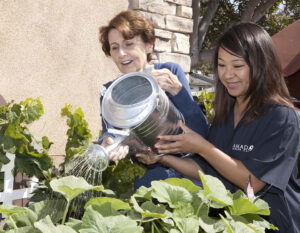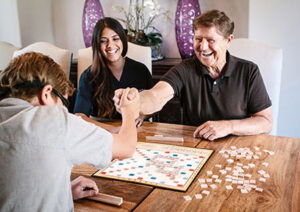It’s a not-so-uncommon scenario. An aging parent, losing his or her independence, presents new challenges for the family which may increase as often as every month as health and conditions change. Medical, financial, and clearly emotional decisions that need to be made can raise the temperature in the room considerably, and with family dynamics a large part of the new (and evolving) normal, making the right choices can be complicated and stressful. Oftentimes, old roles and rivalries resurface among adult children, or are exacerbated if they’ve been present all along, and they may become squabbling adolescents (or younger) again.
Resentment Can Grow When Caregiver Sibling Feels Overwhelmed with Elder Care
In another scenario, Maria Mazur,* 84, of Portland, Ore., began to show increasing signs of dementia and other ailments. Daughter Julie who lived nearby assumed all the caregiving responsibilities. “My sister and brother moved away years ago,” Julie said. “Anne cross country with her husband and son, and John 100 miles north.”
As the older sibling, and having lost their father many years ago, Julie had always seen it as her responsibility to protect Anne and John from any hardships that followed, slipping back into that role in these new circumstances.
Though Julie’s intentions were good, failure to fully apprise her sister and brother of big changes in their mother’s life resulted in their inability to comprehend what was happening. They weren’t given a chance to contribute, and resentment grew on Julie’s part as she shouldered more and more of the burden.
Anxiety Felt by Adults Sons and Daughters on Senior Care Journey
Innumerable studies have been done about the psychology of change and how people react to it. The bottom line is that change is hard. There are all kinds of components involved that may include acknowledgment, acceptance, resistance, denial, and more. How we perceive and handle change has a lot to do with our own life experience. When it comes to adult siblings navigating a whole sea of it in the last years of a parent’s life, change may be fraught with fear, sadness, anger, denial, and in many cases what is called early mourning or anticipatory grief.
No matter who or where we are in the family dynamic, this occurs when we notice a loved one’s abilities diminish, even in small ways, and thoughts about life without them begin to filter in. Anticipatory grief is pernicious, and exhausting mentally, physically, and spiritually. In short, for adult children, an aging parent is like a ticking time bomb set to go off underneath them, often the fear of this happening thwarting attempts at reasonable decision making.
Building a Foundation for Siblings Sharing Care Responsibilities
Experts say the best way for siblings to understand the entire situation, and each other, is to hold a family meeting. Here they can begin to determine responsibilities, establish a care routine for an aging parent, and explore options including the possibility of outside caregivers. In fact, scheduling a meeting each month, if possible, is the best way to keep things on track. If individuals are within reasonable driving distance, a living room where everyone is comfortable, feels safe, and there are few distractions is the optimal locale. But today many families are scattered, so using Zoom or Skype or having a conference call is the next best thing.
At each meeting, an agenda underscored by good communication is key. In business or in families, having an agenda can help ensure everyone has a plan and timetable to adhere to, should emotions erupt or people get off track. In terms of open communication, when people are first allowed to express anything that’s bothering them, their buckets are emptied, so to speak, leaving them better positioned to receive information and address what needs to be addressed.
It’s a basic fact of life that everyone deserves to be heard (without judgement) no matter what is going on their life. Perhaps someone has not shared news of a potential job loss, change in marital status, problems with a child, health problems of their own, fears about draining the senior’s bank account, and more. Once personal issues are on the table, it’s easier to balance them with what needs to be achieved in light of people’s strengths, desires, limitations, available time, etc.
Assessing a Sibling’s Ability to Care for Aging Parents
Many factors influence adult siblings’ ability to care for an aging parent. These include geography, work schedules, child raising, and more. Caregiving responsibilities are almost always divided unequally, so to avoid friction, experts say it’s important to focus on what each family member can do—not on what they are not doing even if the bulk of the work falls on one or two people. Rarely will there be total agreement about what needs to be done, nor complete understanding about how much one person is doing. In these cases, the situation is often made clearer if each sibling keeps a log of what they do each day or week (even a quick line or two per task), with the practice of adding it to a shared document.
Mark Green* of Austin, Texas, said when his mother got sick, given his proximity to her he became her sole caregiver. For many months, he received criticism from three siblings (and their spouses) who did not understand all that was happening, and the difficult decisions Mark had to make all the time. “I admit it’s hard to know what caregiving is like unless you can be there,” Mark said, “so I started to end my days with a quick email update—sometimes including doctor’s notes, test results, etc.” For Mark, that was the easiest way for him to keep everyone apprised. “It took a little discipline, but it worked,” he said. “It wasn’t perfect, but it made a difference in the way my family viewed all of this. Their communication became less critical and more constructive in the way of suggestions and ideas.”
Providing Care for Senior Loved Ones Four Ways
Growing up on a farm outside Grand Forks, North Dakota, Carl Walton* recalls when each of his three siblings was born. He remembers liking the fact that four was an even number: great for games and teams and to share the chores so no one had too much to do—and the occasional day off was possible. Little did he know that these very practices would apply to his father’s later years.
When his mother passed away and his 86-year-old father could no longer live alone, though all four adult siblings had scattered to different states, they decided each would take one week of the month to go back home and care for him. The farm had long ago been sold and he lived in an apartment. Fortunately, with remote work and their own families older, each adult sibling was in a position to do that, a decision that left them completely free the other three weeks of the month.
“It may not be right for everyone,” Carl said. “But for us, it provided a way to be close to him in his last years, help him with his needs, and know we could go back to our own lives the rest of the month confident his care and nurturing would continue at the same level with a sister or brother.”
Sibling Dynamics: Know When to Let It Go or Hire an Elder Mediator
The famous Kenny Rogers song line, “Know when to hold ‘em, know when to fold ‘em” applies here. Sometimes old issues or deep denial on the part of a sibling that things are changing will prevent him or her from moving forward. While this can be a considerable source of frustration and yet more friction, holding onto it can bring even more stress and anger. There are options such as hiring an elder mediator who can help provide solutions family may not be able to achieve on their own, but it can be costly and both parties must agree to it in the first place which may not be possible.
Resolve to Focus on Each Sibling’s Strengths and Capabilities for Senior Care
While rallying the troops may be no easy feat, deciding to focus on each individual’s strengths and capabilities, rather than on what they are unable or unwilling to do, may result in more productive caregiving. Perhaps one sibling is better accomplished at managing finances and dealing with insurance, while another prefers cooking and monitoring meals and medication. Another may lean toward running errands including driving mom or dad to doctor’s appointments.
In the final years of a parent’s life family harmony is always the best choice for sibling. This creates a healthy environment where the senior can thrive with as little stress as possible. To paraphrase thousands who have lost elderly parents, you will never get this time back. Finding some degree of rapprochement serves everyone.
*Names have been changed for privacy purposes.
“Getting Siblings to Help with Elder Care for Aging Parents,” written by Beth Herman, Amada blog contributor.















